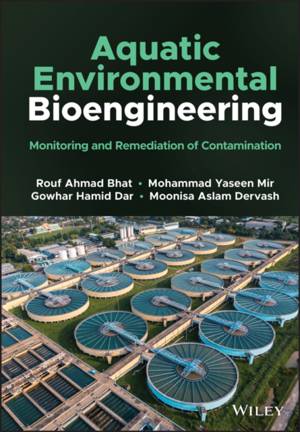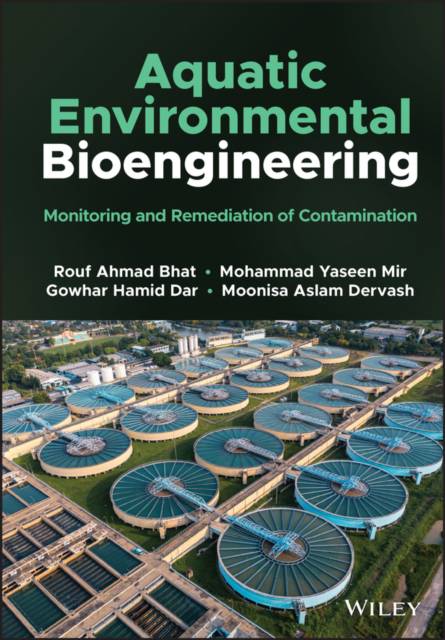
- Afhalen na 1 uur in een winkel met voorraad
- Gratis thuislevering in België vanaf € 30
- Ruim aanbod met 7 miljoen producten
- Afhalen na 1 uur in een winkel met voorraad
- Gratis thuislevering in België vanaf € 30
- Ruim aanbod met 7 miljoen producten
Aquatic Environmental Bioengineering
Monitoring and Remediation of Contamination
Rouf Ahmad Bhat, Mohammad Yaseen Mir, Gowhar Hamid Dar, Moonisa Aslam DervashOmschrijving
Discover the importance of remediation efforts for aquatic ecosystems
Most contamination of water bodies stem from human activity, and the pollution in our water is one of the most important environmental concerns facing future generations. The most significant of these pollutants are halogenated organic compounds, petroleum hydrocarbons, radionuclides, metal and metalloids, pharmaceutical drugs, microbial toxins, and flame retardants. With such a vast array of potential contaminants and dangerously cumulating contamination levels in fragile marine environments, reparative action is more essential than ever.
Aquatic Environmental Bioengineering: Monitoring and Remediation of Contamination provides the reader with a map towards environmentally safe and economically feasible technologies to intervene in polluted aquatic ecosystems. The authors suggest a phased approach consisting of site classification and risk assessment, followed by remediation technology selection and implementation. Effective methods for surveying bodies of water are particularly emphasized, and advancements in the development of novel transgenic plants and microbial fuel cells are put forward as effective tools against environmental contamination and industrial wastewater pollution.
Readers will also find:
- A focus on the most recent and cutting-edge research on the topic: photocatalysis, the use of genetically modified organisms, and the use of nanomaterials
- A simple compendium of fundamental concepts in environmental engineering of aquatic ecosystems
- A detailed discussion of the advancement in remote sensing and geographic information (GIS), methodologies that make it possible to conduct large-scale water remediation studies at reasonable cost
The ideal resource for researchers and students of environmental science, plant biotechnology, agricultural science, environmental engineering, and plant sciences, Aquatic Environmental Bioengineering will be a crucial resource for the remediation of contaminants in our aquatic ecosystems.
Specificaties
Betrokkenen
- Auteur(s):
- Uitgeverij:
Inhoud
- Aantal bladzijden:
- 240
- Taal:
- Engels
Eigenschappen
- Productcode (EAN):
- 9781119760948
- Verschijningsdatum:
- 16/05/2022
- Uitvoering:
- Hardcover
- Formaat:
- Genaaid
- Afmetingen:
- 170 mm x 244 mm
- Gewicht:
- 580 g

Alleen bij Standaard Boekhandel
Beoordelingen
We publiceren alleen reviews die voldoen aan de voorwaarden voor reviews. Bekijk onze voorwaarden voor reviews.











